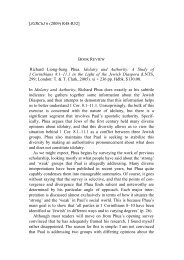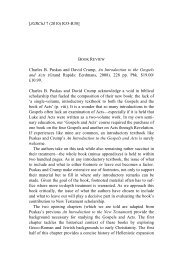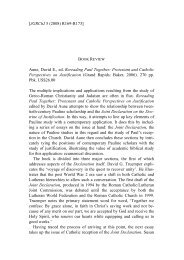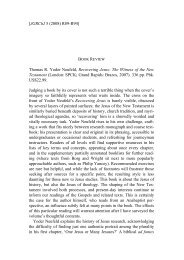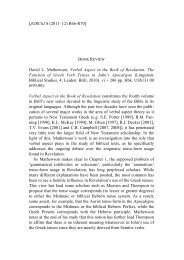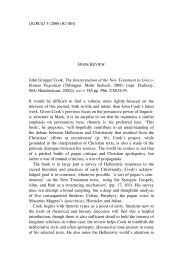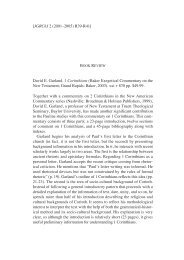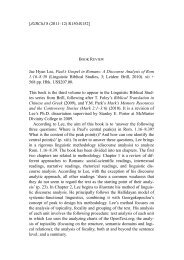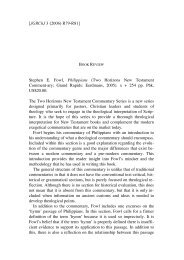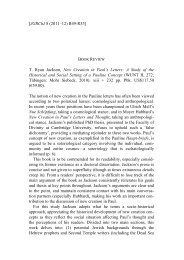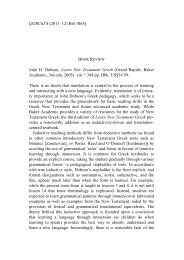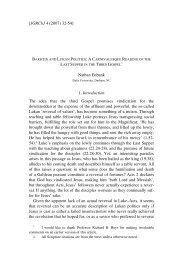The Politics of Ephesians and the Empire - Journal of Greco-Roman ...
The Politics of Ephesians and the Empire - Journal of Greco-Roman ...
The Politics of Ephesians and the Empire - Journal of Greco-Roman ...
Create successful ePaper yourself
Turn your PDF publications into a flip-book with our unique Google optimized e-Paper software.
Gupta & Long <strong>Politics</strong> <strong>of</strong> <strong>Ephesians</strong> <strong>and</strong> <strong>the</strong> <strong>Empire</strong> 125<br />
even in human terms (that is, with bloody warfare involving bloodshed<br />
<strong>of</strong> human flesh). Ra<strong>the</strong>r, <strong>the</strong>y are engaged in ideological-spiritual conflict<br />
with evil human rulers <strong>and</strong> evil authorities in <strong>the</strong> heavenly realms. This<br />
interpretation is actually dem<strong>and</strong>ed by <strong>the</strong> whole context <strong>of</strong> <strong>the</strong> letter,<br />
in which <strong>the</strong> imperial human ruler in 2.2 is shown to be in cahoots with<br />
<strong>the</strong> evil spirit. <strong>The</strong> struggle <strong>of</strong> 6.12 will indeed require wise resistance<br />
both to people in positions <strong>of</strong> rule who set st<strong>and</strong>ards for imitation (like<br />
<strong>the</strong> pietas <strong>of</strong> <strong>the</strong> <strong>Roman</strong> emperors), as well as to <strong>the</strong> evil spiritual forces<br />
or authorities in <strong>and</strong> around <strong>the</strong>m that promote evil in conduct through<br />
deception. This is why <strong>the</strong> letter encourages <strong>the</strong> church assembly to<br />
grow in truth <strong>and</strong> correct teaching in opposition to deceptive ‘human<br />
doctrine’ that uses deceitful scheming (4.14-16). Thus, <strong>the</strong> nature <strong>and</strong><br />
kind <strong>of</strong> Christian resistance might very well involve imitating <strong>the</strong> example<br />
<strong>of</strong> <strong>the</strong> chief comm<strong>and</strong>er <strong>of</strong> <strong>the</strong> forces (<strong>the</strong> Messiah Jesus) <strong>and</strong> <strong>the</strong><br />
appointed leaders (Paul in <strong>the</strong> letter), who would choose bold prophetic<br />
pronouncement, which might result in imprisonment in <strong>the</strong> face <strong>of</strong> death.<br />
However, wisdom is required (5.15-17).<br />
At this point, having surveyed references to rulers <strong>and</strong> spiritual<br />
entities across <strong>the</strong> letter starting with Eph. 1.15-23, we can turn to address<br />
Elliott’s second concern, that 1.19-21 seems to present Christ as Lord <strong>of</strong><br />
all authorities, earthly <strong>and</strong> heavenly, <strong>and</strong> thus puts his divine blessing<br />
on <strong>the</strong> acts <strong>and</strong> governance <strong>of</strong> <strong>the</strong> human rulers. However, 1.19-21 must<br />
be read toge<strong>the</strong>r with 6.12, which is understood by many to represent<br />
part <strong>of</strong> <strong>the</strong> peroratio or summarizing conclusion to <strong>the</strong> epistle. Somehow,<br />
<strong>Ephesians</strong> depicts Christ as ruler <strong>of</strong> rulers, who has put all o<strong>the</strong>r enemies<br />
beneath him—even heavenly ones. And yet, <strong>the</strong> final chord struck in<br />
<strong>Ephesians</strong> is a brooding tone <strong>of</strong> conflict. Far from promoting a sort <strong>of</strong><br />
mystical <strong>the</strong>ology <strong>of</strong> spiritual pacification, <strong>Ephesians</strong> boldly asserts that,<br />
even in view <strong>of</strong> <strong>the</strong> supreme victory <strong>of</strong> God in Christ, ‘<strong>the</strong> heavenly<br />
places remain contested space’. 48<br />
N.T. Wright explains this as de facto <strong>and</strong> de jure power, where <strong>the</strong><br />
authorities <strong>of</strong> <strong>the</strong> present evil age have been defeated by <strong>the</strong> cross but<br />
<strong>the</strong>re is still a ‘time-lag’—as in <strong>the</strong> well-known gap between D-day <strong>and</strong><br />
V-day. 49 <strong>Ephesians</strong> encodes <strong>the</strong> author as Paul, <strong>the</strong> one who proclaims <strong>the</strong><br />
48. R. Foster, ‘Reoriented to <strong>the</strong> Cosmos: Cosmology <strong>and</strong> <strong>The</strong>ology in <strong>Ephesians</strong><br />
through Philemon’, in S. McDonough <strong>and</strong> J. Pennington (eds.), Cosmology <strong>and</strong> New<br />
Testament <strong>The</strong>ology (LNTS, 355; London: T. & T. Clark, 2008), pp. 107-24 (108).<br />
49. See N.T. Wright, ‘<strong>The</strong> New Testament <strong>and</strong> <strong>the</strong> State’, <strong>The</strong>melios 16 (1990),<br />
pp. 11-17 (14).



